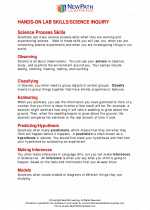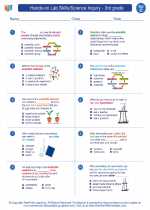Phenotype
The phenotype refers to the observable traits or characteristics of an organism, such as its physical appearance, behavior, and other observable properties. These traits are the result of the interaction between an organism's genetic makeup (genotype) and environmental influences.
Factors Influencing Phenotype
The phenotype of an organism is influenced by several factors:
- Genotype: The specific combination of genes that an organism inherits from its parents.
- Environment: External factors such as nutrition, climate, and exposure to toxins can also influence an organism's phenotype.
- Gene Expression: The process by which information from a gene is used to produce a functional gene product, such as a protein, ultimately affecting the phenotype.
Examples of Phenotypic Traits
Phenotypic traits can include:
- Physical characteristics (e.g., eye color, hair texture, and height)
- Physiological traits (e.g., blood type, metabolism, and disease susceptibility)
- Behavioral traits (e.g., temperament, learning ability, and response to stimuli)
Study Guide for Phenotype
To understand the concept of phenotype, consider the following study guide:
- Review the basics of genetics and the relationship between genotype and phenotype.
- Explore examples of phenotypic traits in humans, animals, and plants, and discuss how they are influenced by both genetic and environmental factors.
- Examine the concept of gene expression and its role in determining phenotype.
- Discuss the impact of mutations and genetic variations on phenotypic traits.
- Investigate the role of natural selection and evolution in shaping phenotypic diversity within a species.
Understanding phenotype is essential for comprehending how genetic information translates into observable characteristics, and how these traits can evolve over time.
.◂Science Worksheets and Study Guides Third Grade. Hands-on Lab Skills/Science Inquiry - 3rd grade
Study Guide Hands-on Lab Skills/Science Inquiry - 3rd grade
Hands-on Lab Skills/Science Inquiry - 3rd grade  Worksheet/Answer key
Worksheet/Answer key Hands-on Lab Skills/Science Inquiry - 3rd grade
Hands-on Lab Skills/Science Inquiry - 3rd grade  Worksheet/Answer key
Worksheet/Answer key Hands-on Lab Skills/Science Inquiry - 3rd grade
Hands-on Lab Skills/Science Inquiry - 3rd grade  Worksheet/Answer key
Worksheet/Answer key Hands-on Lab Skills/Science Inquiry - 3rd grade
Hands-on Lab Skills/Science Inquiry - 3rd grade  Worksheet/Answer key
Worksheet/Answer key O-W-L
O-W-L  Vocabulary/Answer key
Vocabulary/Answer key Hands-on Lab Skills/Science Inquiry - 3rd grade
Hands-on Lab Skills/Science Inquiry - 3rd grade  Vocabulary/Answer key
Vocabulary/Answer key Hands-on Lab Skills/Science Inquiry - 3rd grade
Hands-on Lab Skills/Science Inquiry - 3rd grade 

 Worksheet/Answer key
Worksheet/Answer key
 Worksheet/Answer key
Worksheet/Answer key
 Worksheet/Answer key
Worksheet/Answer key
 Worksheet/Answer key
Worksheet/Answer key
 Vocabulary/Answer key
Vocabulary/Answer key
 Vocabulary/Answer key
Vocabulary/Answer key

The resources above cover the following skills:
Science as Inquiry and Process: A student should understand and be able to apply the processes and applications of scientific inquiry. A student who meets the content standard should:
Develop an understanding of the processes of science used to investigate problems, design and conduct repeatable scientific investigations, and defend scientific arguments.